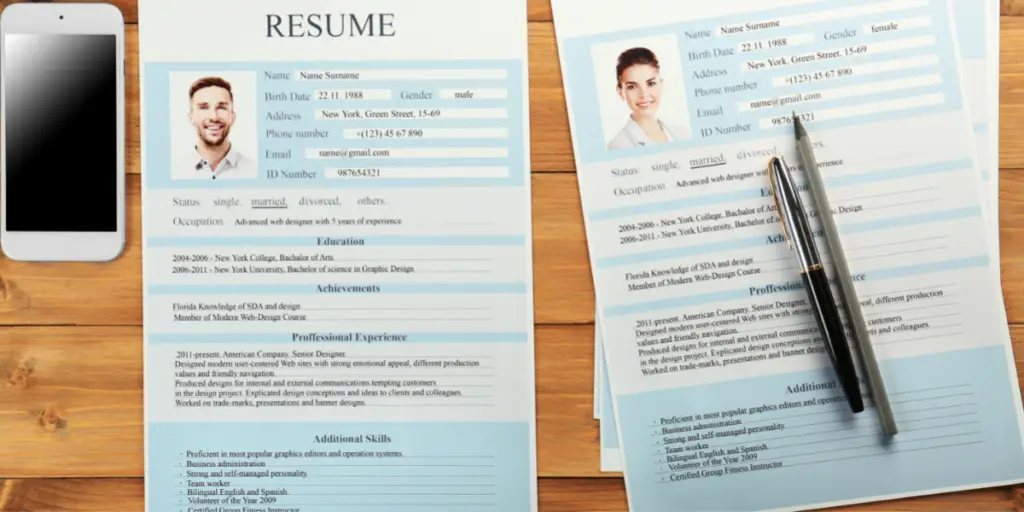Disclaimer: We sometimes use affiliate links in our content. For more information, visit our Disclaimer Page.
Are you looking for a job that requires leadership skills? If so, you will want to make sure that your resume highlights your abilities in this area. Many jobs require strong leadership skills, and having them on your resume can give you an edge over the competition.
This blog post will discuss the top 14 important leadership skills examples essential for any resume.
Related: List of Skills for Resume
What are leadership skills?
To effectively manage people, one must first understand them. Leadership skills are individuals’ abilities and talents to help execute processes, guide projects, and steer personnel toward objectives.
Many people mistakenly believe that leadership skills are only acquired through years of experience or completing a leadership development program. Yet, leadership qualities can be found in people of all ages and from all walks of life.
Soft Skills or Technical skills, such as the ability to develop and implement strategies, are essential for leadership positions. However, leadership also requires interpersonal skills, such as the ability to motivate and inspire others. Therefore, when a hiring manager is searching for leaders, they often include technical and interpersonal skills as a requirement in the job description.
By developing your leadership skills, you can position yourself for success in any organization.
Related: 15 Leadership Strengths Leaders Must Have
14 Leadership skills For resume

Describe leadership skills in your resume to tell potential employers that you can motivate, inspire, and guide others. Here are the top fourteen resume leadership skills examples that you should include.
1. Integrity
Integrity is one of the great leadership skills. It is essential for both personal and professional success. Integrity encompasses many different qualities, such as truthfulness, honesty, ethicality, and reliability. Employers value employees with integrity in the workplace because they are more likely to make choices that positively reflect the company.
In addition, integrity workers tend to be better leaders, setting a strong example for their team members. Leaders with integrity display qualities such as diplomacy, ethical decision-making, and confidentiality. These characteristics inspire trust in those being led and help create a cohesive and productive work environment.
Ultimately, integrity is essential for anyone seeking success in personal or professional life. So, if you want to highlight your integrity on your resume, include any instances where you have acted with honesty and integrity, even in difficult situations.
2. Relationship building
The ability to build strong relationships is another critical leadership skill. Leaders who can develop positive relationships with their team members are more likely to foster a cohesive and productive work environment.
When team members trust and respect their leader, they are more likely to be motivated and inspired to achieve common goals. Leaders who can effectively build relationships also tend to be better at communication and problem-solving.
3. Creativity
One of the most important skills you can possess is creativity as a leader. Creative leaders are better able to solve problems and develop new and innovative solutions.
In today’s rapidly changing world, employers value leaders who can think outside the box and bring new ideas to the table.
If you want to showcase your creativity on your resume, highlight any times you came up with an original solution to a problem.
4. Delegation
Delegation is another key leadership skill. Leaders who can delegate effectively can get more done in less time. When delegation is done correctly, it can also empower team members and help them develop new skills.
When delegating tasks, it is vital to be clear about what needs to be done and expectations. Be sure to give your team members the resources they need to succeed. And, most importantly, provide feedback along the way.
5. Problem-solving
Problem-solving is an indispensable skill for any leader. After all, leadership is all about solving problems. Whether it’s a problem within the team, a problem with a client, or a problem with the business itself, leaders need to identify the problem and then find the best solution.
There are many different approaches to problem-solving, but the best leaders can think creatively and outside the box. They’re also able to consider all of the various stakeholders involved and find the best solution for everyone.
6. Trustworthiness
Being a trustworthy person is about following through with your commitments and being someone that other people can rely on. In the workplace, this means being someone accountable, hardworking, positive, persistent, and respectful.
These are all qualities that good leaders possess and can help make them role models for their teams. If you want potential employers to see you as trustworthy, focus on demonstrating these qualities in your resume. Show that you are someone who meets deadlines, works hard, and is always looking for ways to improve. You will set yourself apart as a candidate who can be trusted to provide value to any organization.
7. Communication Skills

Being an effective communicator is one of the most necessary skills that a leader can possess. After all, relationships are built through communication, goals are set, and ideas are exchanged. Moreover, in today’s fast-paced, constantly-connected world, the ability to communicate effectively is more critical than ever.
Whether conveying your ideas or those of your team, a leader must be able to get their point across clearly and concisely. Furthermore, it is also essential for a leader to be a good listener. By listening to what others are saying, a leader can build trust, resolve conflicts, and find new and innovative solutions to problems. In short, communication is the key to success for any leader.
8. Adaptability
It is more important than ever for leaders to be adaptable in today’s ever-changing world. Being adaptable requires a mix of creativity, flexibility, and resourcefulness. Leaders who can adapt quickly to change are more likely to succeed in today’s business landscape.
While adaptability is a skill that all leaders must possess, it is especially important for those who operate in fast-paced industries. In these industries, change is constant, and leaders must be able to adjust their plans on the fly. Those who are not adaptable will quickly fall behind and struggle to keep up with the competition.
Adaptability is an essential skill for leaders, but it is also an innate human quality that we rely on overtime. Throughout history, humans have had to adapt to different environments and situations. Yet, the ability to adapt has allowed us to survive and thrive as a species. In the modern world, adaptability is just as important as it has always been. Leaders who are not afraid to experiment and are open to change will be the ones who succeed in today’s business landscape.
9. Vision
As anyone in business knows, it is essential to have a vision for your company. Without a clear idea of where you want to be in the future, it isn’t easy to make strategic decisions that will help you achieve your goals. In addition, big picture thinking is essential for anticipating trends and changes in your industry to adapt your plans accordingly.
This means constantly evaluating your progress and ensuring that you are on track to reach your destination. It also requires keeping your finger on the pulse of your market so that you can detect any changes that could impact your plans. Finally, by having a solid vision for your company, you will be better able to make the decisions that will help you achieve success.
10. Decisiveness
Decisiveness is also another essential quality for any leader. There is rarely a total consensus on any issue in any team, so it is up to the leader to make the final decision. This can be not easy, but a leader must trust their judgment and be brave in making decisions.
If leaders constantly waver and are unsure of themselves, they will not inspire confidence in their team. The best way to make decisions is to base them on the best possible facts and opinions available at the time. By doing this, leaders can make decisions that their team can trust and follow.
11. Influence
The ability to influence others is a critical skill for any leader. To be successful, you must be able to see things from other people’s perspectives and understand what motivates them. Only then can you begin to persuade them to support your vision.
Building close relationships are essential for effective influencing. People are more likely to support you if they know and trust you. Therefore, it’s vital to take the time to get to know the people around you. Gratitude is also key.
Thanking people for their support shows that you value their contribution and makes them more likely to continue backing you in the future. By mastering the art of influencing, you’ll be able to achieve your goals and make your dreams a reality.
12. Self-awareness
Self-awareness is the ability to see oneself clearly and objectively. It’s an important skill for leaders because it allows them to understand their strengths and weaknesses and their impact on others.
Self-aware leaders can use this knowledge to communicate and manage relationships effectively. They can also make better decisions because they understand how their own emotions and biases can impact the situation.
Self-awareness is not something that you either have or don’t have. Instead, it’s a skill you can develop over time with practice. If you’re not sure where to start, here are a few things you can do to increase your self-awareness:
- Pay attention to your emotions. When something happens, take a moment to notice how you’re feeling. What is causing these emotions?
- Be curious about yourself. Why do you do the things you do? What motivates you? How do you react in different situations?
- Seek feedback from others. Ask people you trust for their honest opinion about your strengths and weaknesses.
- Keep a journal. Writing about your thoughts and experiences can help you to understand yourself better.
- Take time for reflection. Spend some time each day thinking about your goals, values, and how you’re progressing towards them.
13. Time Management
As a leader, time management is an important skill to have. It can help you keep track of projects, deadlines, and goals. It can also help you delegate tasks and efficiently manage your team’s time. You can become a more effective and successful leader by working your time well.
Time management is not only about being able to juggle multiple tasks and projects. It is also about prioritizing and focusing on the most critical tasks. Leaders who are good at time management can usually identify what is most important and delegate or schedule accordingly. They are also generally very good at multitasking and keeping track of many different things.
Being a leader requires being able to wear many hats and juggle multiple responsibilities. Time management skills can help you do this more effectively and efficiently. As a result, you can become a more prosperous and effective leader by managing your time well.
14. Tech-Savvy

Being tech-savvy is no longer optional for leaders in today’s business world. It’s a great leadership skill to stay ahead. With technology becoming ever more prevalent and integrated into every aspect of running a business, those in leadership positions must be able to understand and use technology and harness it to its full potential.
There are many reasons why tech-savviness is such an essential skill for leaders. For one, technology can be a powerful tool for improving efficiency and productivity within an organization. When used correctly, it can automate tasks, streamline processes, and make it easier for employees to collaborate and communicate with one another. Additionally, technology can also gather data and insights to help leaders make more informed decisions.
Of course, being tech-savvy isn’t just about using technology to improve the bottom line. In today’s connected world, leaders must also be able to navigate the ever-changing landscape of social media and digital communications. This includes understanding how to use various platforms for branding and marketing purposes and engaging with customers and stakeholders online.
Related: Examples of Organizational Skills for Your Resume
Final Thoughts
Leadership is a complex skill that requires many different abilities and traits. While some people are born with certain qualities that make them natural leaders, others can develop leadership skills over time with practice. Good leadership skills can help you meet your individual, team, departmental, and organizational goals.
No matter where you fall on the spectrum, there are always ways to improve your leadership skills. By focusing on developing the skills listed above, you can become a more effective and successful leader. At last, don’t forget to showcase leadership skills that you are an expert in.





